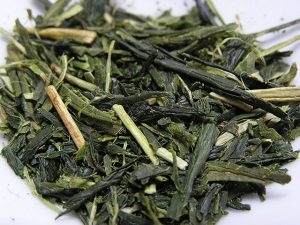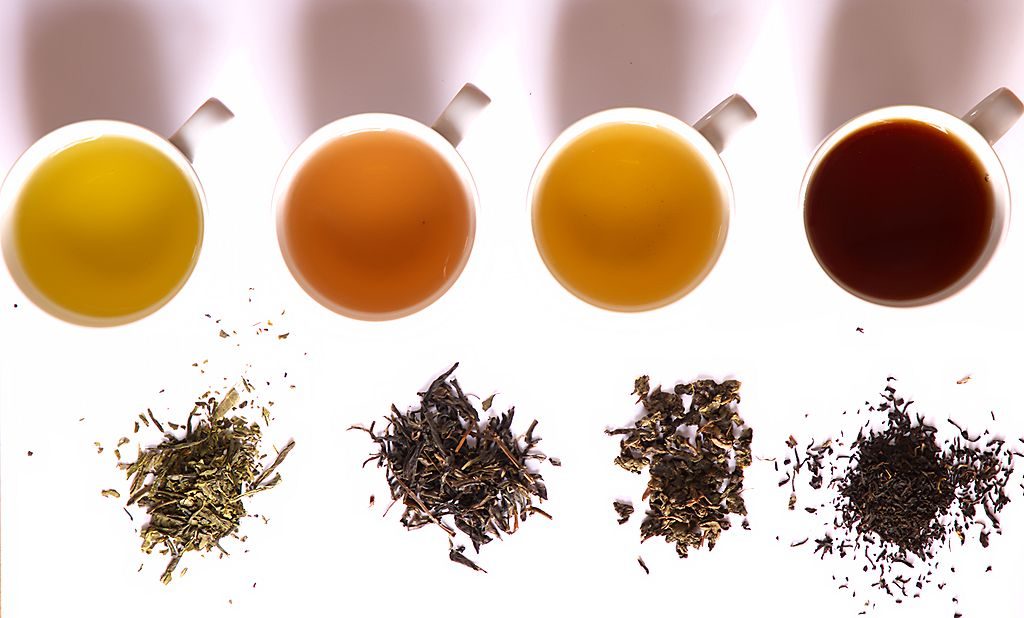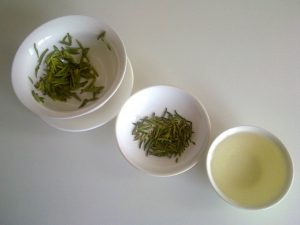Green tea seems to provide a small but consistent fat-burning effect.

- Boost metabolism. Green tea enhances the body’s thermogenesis and fat oxidation.
- Limit fat digestion by inhibiting fat-digesting enzymes.
- Enhance exercise-induced fat loss, allowing you to lose weight faster when you work out.
Overview
Green tea is one of the healthiest and most popular beverages in the world. Like other types of tea, it is produced from the leaves and stems of the Camellia sinensis plant. Extensive research has shown that green tea helps with a wide variety of health conditions, including obesity, heart issues, high cholesterol, gastric discomforts, diabetes, inflammatory disorders, and more.
Green tea contains a combination of vitamins, minerals, and caffeine. However, most of its health benefits can be attributed to active ingredients known as polyphenols and catechins – plant compounds with strong antioxidant activity. Compared to black and other types of tea, green tea maintains high polyphenol concentrations because it does not undergo oxidation. The most potent of these polyphenols is epigallocatechin gallate (EGCG)—the compound most responsible for green tea’s reputation as a fat burner.
Clinical researchers agree that green tea has a small positive effect on weight loss and weight maintenance.1

How Green Tea Might Help with Fat Burning
Most of green tea’s beneficial effects on body fat and weight come from the the synergistic actions of EGCG and caffeine.
Improved metabolism
Green tea has been shown to improve metabolic rate — the amount of calories our bodies burn. Green tea appears to achieve this by increase the body’s heat production (thermogenesis) and fat oxidation — the burning of fat to produce energy.
In particular, EGCG seems to work together with caffeine to inhibit a norepinephrine-degrading enzyme called catechol-O-methyltransferase (COMT), thus increasing norepinephrine in the bloodstream. Norepinephrine is a hormone responsible for increasing the metabolic rate and signaling the breakdown of fat. 2 All of these processes together enhance metabolism and accelerate the burning of fat. 3
Limited digestion and absorption of fat
Green tea and its extracts have also been shown to inhibit enzymes that aid fat digestion in the stomach and pancreas. 4 EGCG in particular has been shown to inhibit the action of pancreatic lipase – a key fat digestion enzyme.5 In addition, green tea also appears to inhibit the absorption of fatty acids.
Regulation of blood lipids
Furthermore, green tea has been shown to lower blood levels of cholesterol by inhibiting its solubility, as well as triglycerides through delaying their absorption.6 In addition, it has also been demonstrated to lower free fatty acids, glucose, and insulin — other parameters strongly associated with obesity and metabolic syndrome. 7
Green Tea’s Fat-Burning Benefits

In addition, research suggests that green tea can also enhance exercise-induced fat loss by further increasing the body’s fat oxidation during physical activity.8
Ultimately, although green tea’s fat-burning effect may not be as strong as some other supplements, it remains popular as a drink thanks to its combination of multiple health benefits, such as the promotion of wakefulness and anti-inflammatory activity.
Research
Animal Research
Animal studies of green tea corroborate the results of human trials. Specific findings show that green tea may:
- Promote fat loss and suppress weight gain through increased thermogenesis and reduced fat digestion in rats 10 11
- Attenuate obesity and metabolic syndrome symptoms through decreased inflammation and fat absorption12
- Increase the fat-burning effects of endurance exercise in mice13
Human Research
Studies of green tea in man provide a solid amount of evidence for its fat-burning effects.
Green tea extract (856.8 mg) can reduce weight, waist circumference, and total cholesterol levels
In this randomized, double-blind trial, 115 obese women were assigned to either a high-dose green tea extract (856.8 mg/day) group or a placebo group for 12 weeks. The study found that the green tea group had significant weight loss, decreased basal metabolic index, reduced waist circumference, lower total cholesterol and decreased LDL cholesterol.
- The researchers concluded that “12 weeks of treatment with high-dose green tea extract resulted in significant weight loss“14
Green tea appears to promote weight loss in obese individuals
This randomized study examined the effects of green tea on body weight and related parameters. Thirty-five obese people took placebo, green tea (4 cups), or green tea extract (2 capsules) daily for 8 weeks. The two green tea groups had a similar intake of EGCG.
The study found that green tea and green tea extract led to a significant reduction of body weight and body mass index (BMI) compared to placebo (-2.5 kg and – 1.9 kg, respectively).
- The researchers concluded that “Green tea beverage consumption (4 cups/d) or extract supplementation (2 capsules/d) for 8 weeks significantly decreased body weight and BMI“15
Green tea may improve exercise-induced fat loss in overweight/obese adults
This randomized study looked at the effects of a green tea drink on body composition in overweight and obese individuals undergoing exercise. A total of 132 people were given a beverage containing 525 mg green tea catechins with 39 mg caffeine or placebo (39 mg caffeine) daily for 12 weeks, while undergoing 180 minutes of moderate exercise per week. Although changes in fat mass did not differ between the two groups, there was a trend for greater weight loss in the catechin group.
- The researchers concluded that “green tea catechin consumption enhances exercise-induced changes in abdominal fat and serum TG“16
Green tea extract (750 mg) appears to promote weight loss in obese adults
Sixty obese people were given placebo or green tea extract capsules (750 mg total) daily for 12 weeks. The green tea group experienced significantly more weight loss than placebo, and also had higher resting energy expenditure (REE; amount of calories burned at rest). This energy expenditure increase was estimated to be equivalent to about 1/3 of the REE increase from moderate exercise.
- The researchers concluded that “green tea can reduce body weight in obese Thai subjects by increasing energy expenditure and fat oxidation“17
Dosage for Fat Burning
- An average cup of tea contains 50 – 150 mg of polyphenols and 20 – 50 mg caffeine
- In beverage form, 2-4 cups of green tea daily is recommended to promote weight loss
- In green tea extract form, up to 750 mg of standardized extract is recommended
Supplements in Review Says
- Green tea as a beverage (2-4 cups) or extract (400 – 750 mg) daily.
Although its fat-burning effect is minor, green tea has been researched extensively. Whereas many weight loss supplements have seen little to no research and often report negative findings, studies of green tea have been overwhelmingly positive.
If you already drink tea or coffee, it may be easier to just drink green tea in its natural form. While there’s nothing wrong with taking a green tea extract, wholesome foods are favored over supplements because they haven’t been processed.
References
Leave a Reply